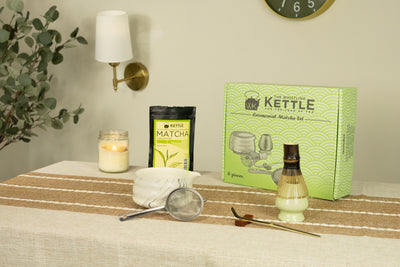The terms “herbal” and "tisane" may be a bit confusing, as some cultures use both terms interchangeably. However, for the purposes of most Western shoppers, we'll break down how these two teas are commonly sold.
Table of Contents
Definitions. What do we mean by "herbal tea" and "tisane"?
First, let's go over the "official" definitions. The terms "herbal tea" and "tisane" are often used interchangeably, but there is a subtle difference in their definitions.
In real life, there are a variety of teas with herbs, seeds, fruits, etc. However, for the most part, many tea suppliers will refer to fruit tisane to describe any tea made mainly from fruit pieces. These tisanes aren't really consumed for specific health properties, although many of them have high levels of vitamin C. Herbal teas, on the other hand, include leaves, flowers, seeds, but little to no fruit pieces. Most of the time, these are listed under herbal teas, but some sellers might use tisanes.
Herbal Tea
Herbal tea refers to any beverage made by steeping herbs, flowers, fruits, or other plant materials in hot water. It does not contain leaves from the Camellia sinensis plant, which is used to produce true tea (such as black, green, oolong, etc.). Herbal teas are typically caffeine-free and can have various flavors and therapeutic properties. Some common examples include chamomile tea, peppermint tea, and hibiscus tea.
Tisane
The term "tisane" is more specific and refers to a herbal infusion or beverage made from the infusion of herbs or botanicals, usually without any tea leaves. In other words, a tisane is a specific type of herbal tea. Tisanes are often enjoyed for their flavors, relaxation benefits, or therapeutic properties. They can include various ingredients such as herbs, spices, flowers, fruits, or other plant materials. Tisanes are typically caffeine-free and are often consumed for their soothing or health-promoting qualities.
All tisanes are herbal teas, but not all herbal teas are considered tisanes. The term "tisane" specifically highlights a herbal infusion made without the use of tea leaves, while the term "herbal tea" encompasses a broader range of hot beverages made by steeping plant materials in hot water.
Popular Herbal Teas
There are some additional herbal teas that are popular enough on their own to form a new category. An example of this is Honeybush and Yerba Mate. You might find these teas under the herbal section of a tea store, but if there are more than a few versions, it typically becomes a whole new category.
Caffeine in Herbal Teas and Tisanes
Most herbal teas contain zero caffeine. Some exceptions to this are Yerba Mate and Guayusa.
Health Benefits of Herbal Teas and Tisanes
Generally, most herbal teas / tisanes are good for you in some way if consumed moderately. Some herbs are known for specific health properties. A common one is Peppermint, which helps calm the stomach. Others, like Chamomile, help relax you.
Dosing is a critical factor, and tea in general is consumed in low doses, making it safe. This changes if you try to take extracts or supplements that can have potentially harmful doses of a particular herb or plant.
It is important to check what herbs you may be drinking if you are pregnant or taking prescription medication, as they can potentially interact.
Most reputable suppliers may shy away from certain herbs known to have dangerous side effects. For example, herbs like kava, comfrey, and pennyroyal have appeared on toxic plant lists but are available over the counter anywhere.
Do your homework. Before drinking any herbal tea, ask the following questions:
- Is it safe?
- Does it work?
- What dosage works?
- What part of the plant works? (root, stem, leaf)
Talk to your healthcare team. Inform all those involved in your healthcare, both physical and mental health, that you're considering taking an herbal supplement. Discuss whether the supplement is safe and effective in general and for you specifically. Remind healthcare providers of any conditions you have and any prescription or over-the-counter medications you take. Don't wait for them to ask.
Brewing Herbal Teas and Tisanes
Brewing herbal teas and fruit tisanes are similar to one another, both requiring boiling water of 212 F. The steeping time for a herbal tea can vary from 5-7 minutes, while fruit tisanes are generally steeped longer for 7-10 minutes. Herbal and fruit teas are forgiving when it comes to steeping, allowing for them to be steeped longer without the worry of the tea becoming bitter.
For both safety and to extract all the benefits from the herbs, roots and dried fruit, it's important to make sure you use water that is close to or at boiling. Never cold brew herbal or fruit tisanes. If you're using an herbal or fruit tisane tea for making iced tea, be sure to follow our instructions for how to hot brew iced tea.

